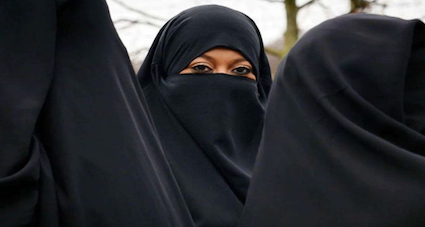It’s been 75 years since B.R. Ambedkar wrote his “Pakistan or Partition of India” — as the name would suggest it was in 1945 when India was yet to be severed of its land in West and East.
Below are his views on “Purdah/Hijab”:
“As a consequence of the purdah system, a segregation of the Muslim women is brought about. The ladies are not expected to visit the outer rooms, verandahs, or gardens; their quarters are in the backyard. All of them, young and old, are confined in the same room. No male servant can work in their presence. A woman is allowed to see only her sons, brothers, father, uncles, and husband, or any other near relation who may be admitted to a position of trust. She cannot go even to the mosque to pray, and must wear burka (veil) whenever she has to go out.
“These burka women walking in the streets is one of the most hideous sights one can witness in India. Such seclusion cannot but have its deteriorating effects upon the physical constitution of Muslim women….”.
“Such seclusion cannot but have its deteriorating effects upon the physical constitution of Muslim women. They are usually victims to anaemia, tuberculosis and pyorrhoea. Their bodies are deformed, with their backs bent, bones protruded, hands and feet crooked. Ribs, joints and nearly all their bones ache. Heart palpitation is very often present in them. The result of this pelvic deformity is untimely death at the time of delivery.”
“They lag behind their sisters from other communities, cannot take part in any outdoor activity and are weighed down by a slavish mentality and an inferiority complex. They have no desire for knowledge, because they are taught not to be interested in anything outside the four walls of the house. Purdah women in particular become helpless, timid, and unfit for any fight in life. Considering the large number of purdah women among Muslims in India, one can easily understand the vastness and seriousness of the problem of purdah.
“Purdah deprives Muslim women of mental and moral nourishment. Being deprived of healthy social life, the process of moral degeneration must and does set in. Being completely secluded from the outer world, they engage their minds in petty family quarrels, with the result that they become narrow and restricted in their outlook.
“The physical and intellectual effects of purdah are nothing as compared with its effects on morals. The origin of purdah lies of course in the deep-rooted suspicion of sexual appetites in both sexes and the purpose is to check them by segregating the sexes. But far from achieving the purpose, purdah has adversely affected the morals of Muslim men. Owing to purdah, a Muslim has no contact with any woman outside those who belong to his own household. Even with them his contact extends only to occasional conversation. For a male there is no company of, and no co-mingling with the females, except those who are children or aged. This isolation of the males from females is sure to produce bad effects on the morals of men. It requires no psychoanalyst to say that a social system which cuts off all contact between the two sexes produces an unhealthy tendency towards sexual excesses and unnatural and other morbid habits and ways.
“The evil consequences of purdah are not confined to the Muslim community only. It is responsible for the social segregation of Hindus from Muslims which is the bane of public life in India. This argument may appear far-fetched, and one is inclined to attribute this segregation to the unsociability of the Hindus rather than to purdah among the Muslims. But the Hindus are right when they say that it is not possible to establish social contact between Hindus and Muslims, because such contact can only mean contact between women from one side and men from the other.
“Not that purdah and the evils consequent thereon are not to be found among certain sections of the Hindus in certain parts of the country. But the point of distinction is that among the Muslims, purdah has a religious sanctity which it has not with the Hindus. Purdah has deeper roots among the Muslims than it has among the Hindus, and can only be removed by facing the inevitable conflict between religious injunctions and social needs. The problem of purdah is a real problem with the Muslims – apart from its origin – which it is not with the Hindus. Of any attempt by the Muslims to do away with it, there is no evidence.”
“..So long as one community looks upon the other as a menace there will be no social progress and the spirit of conservatism will continue to dominate the thoughts and actions of both.
“The social evils which characterize the Hindu Society, have been well known. The publication of Mother India by Miss Mayo gave these evils the widest publicity. But while Mother India served the purpose of exposing the evils and calling their authors at the bar of the world to answer for their sins, it created the unfortunate impression throughout the world that while the Hindus were grovelling in the mud of these social evils and were conservative, the Muslims in India were free from them, and as compared to the Hindus, were a progressive people. That, such an impression should prevail, is surprising to those who know the Muslim Society in India at close quarters.
“One may well ask if there is any social evil which is found among the Hindus and is not found among the Muslims?
“There can thus be no manner of doubt that the Muslim Society in India is afflicted by the same social evils as afflict the Hindu Society. Indeed, the Muslims have all the social evils of the Hindus and something more. That something more is the compulsory system of purdah for Muslim women.”


